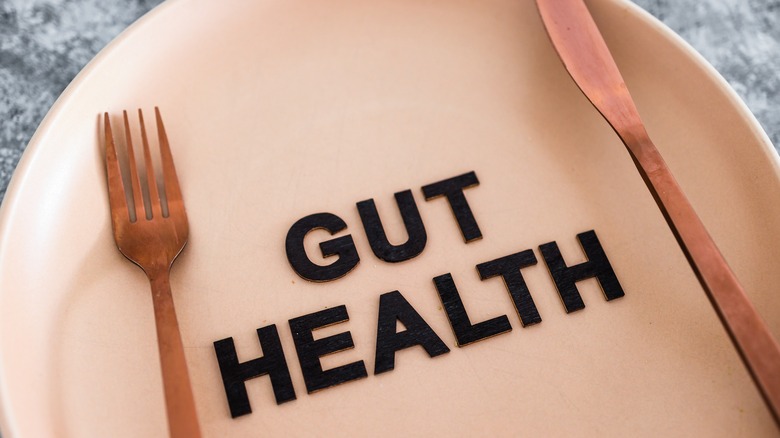Can The Keto Diet Cause Stomach Problems?
Diets are always a hot topic, and the keto diet is no different. The foremost question is, "Does this diet work?" but perhaps it should be, "Is this diet safe?"
Usually, the general idea of "going on a diet" is to eat certain foods that will attain a specific result, such as weight loss. The keto diet has been around since the 1920s as a treatment for epilepsy, according to Epilepsia. However, it has more recently gained popularity as a way to achieve specific body goals. The keto diet specifically targets fat. In the standard keto diet, you eat a high amount of fat, around 70%, a moderate amount of protein, about 20%, and a low amount of carbs, around 10% (per Healthline).
Eating your macronutrients in these portions triggers the body to enter ketosis. When in this state, the body does not have enough carbohydrates to use for energy and instead begins to burn stored fat. This diet can reduce fat or promote weight loss but has other potential benefits. For example, the reduction in carbs might be beneficial to blood sugar levels (per Medical News Today).
While the keto diet may be beneficial for some people, some experts consider the diet unsustainable and not optimal for long-term health due to the high saturated fat content and relatively low intake of fruits and whole grains (per Mayo Clinic). It can also have side effects, such as stomach problems.
The keto diet may cause gastrointestinal trouble
Achieving ketosis requires a fairly significant change in the diet. This change can lead to negative side effects as the body adapts. In a 2019 study by Gut, researchers determined that eating high levels of fat can cause inflammation and lead to an adverse change to the healthy gut bacteria. This bacteria is part of the microbiome of living organisms within our gut that are important to digestion, metabolism, immune health, and even mood (per WebMD).
The increased fat from following the keto diet can also affect the liver. The liver is responsible for breaking down consumed food. Bile is the digestive substance produced by the liver that is responsible for waste removal and breaking down fat so it can be absorbed and used by the body. According to Medical News Today, the high fat content from the keto diet will push the liver to produce more bile than usual which can cause diarrhea and even have a laxative effect.
Mayo Clinic notes that the keto diet can cause side effects such as constipation due to its low carb content. The combination of high fat and low carb content can also lead to nausea and bloating, adds Medical News Today. Furthermore, many people on the keto diet use sugar substitutes. Artificial sweeteners are substitutes for sugar that contain little or no calories. Unfortunately, these sweeteners can also cause changes to the gut bacteria and induce diarrhea (via Healthline).
How to reduce stomach issues
Eating high fat and replacing carbs are the foundation of keto, so it may be hard to avoid these issues, but there are ways to reduce the effects. The simplest is to slowly adjust carb and fat intake to help the body gradually get used to the new diet (per Medical News Today).
Eating more fiber and prebiotic and probiotic foods or supplements can help improve digestion and support healthy gut bacteria. Adding low-calorie foods with healthy fiber can help to alleviate diarrhea and constipation. Prebiotics are plant fibers that stimulate the growth of beneficial gut bacteria. Probiotics are living organisms that contribute to the beneficial bacteria levels within the gut. Supporting these bacteria might help promote proper digestive function (via Genes).
Dairy products may become a staple of your diet when switching to keto. Consuming lots of dairy could cause a previously unknown intolerance to flare up. Dairy intolerance is an inability to fully digest the sugar in milk. This condition can lead to diarrhea (via Mayo Clinic). Reducing dairy consumption may prevent this. Similarly, decreasing the intake of sugar substitutes can also reduce the negative impact of switching to the diet (per Medical News Today).
Medical News Today adds that you should always consult your doctor before making significant dietary changes. Most people don't need the keto diet to attain their health goals, and less extreme dietary patterns may bring fewer side effects. See your doctor if you experience diarrhea or constipation that is severe or long-lasting.



